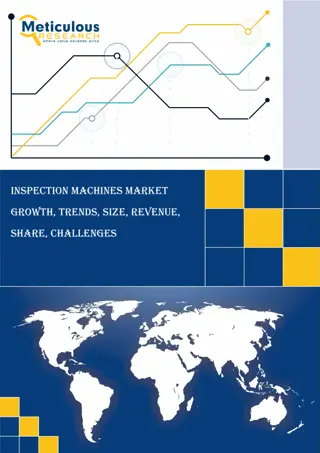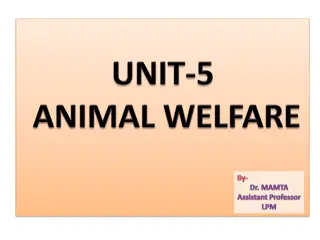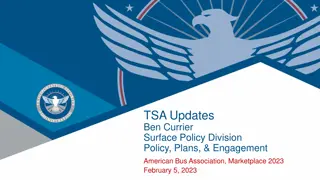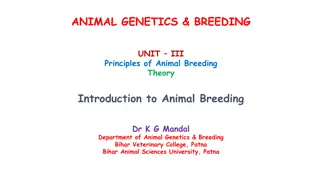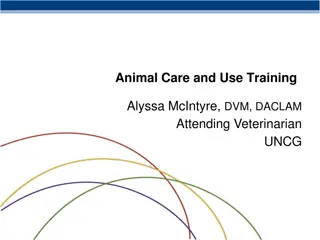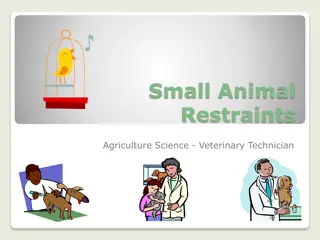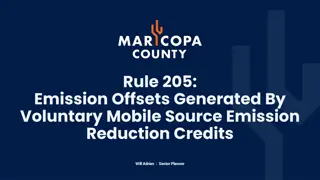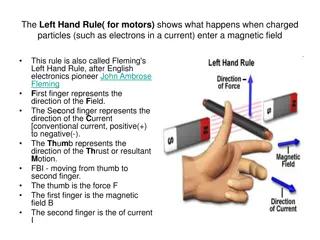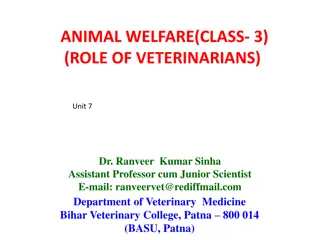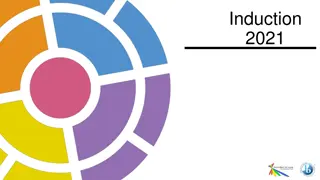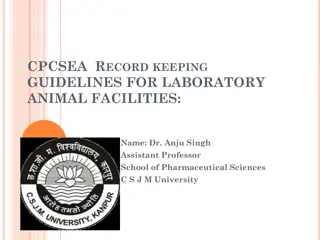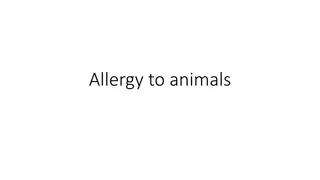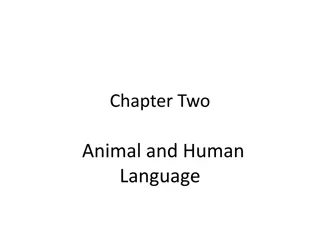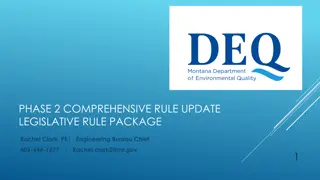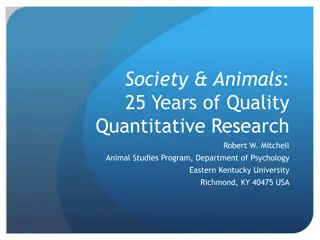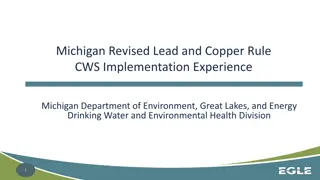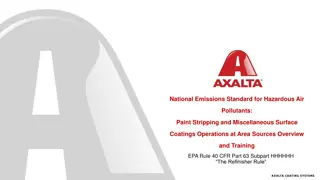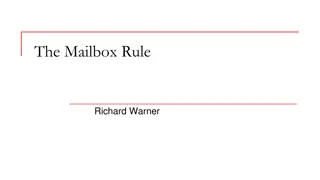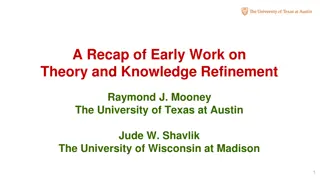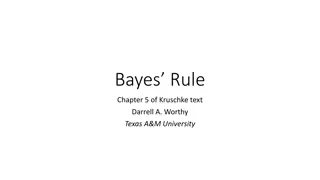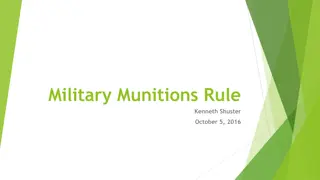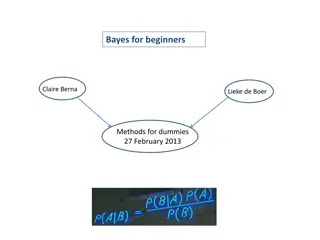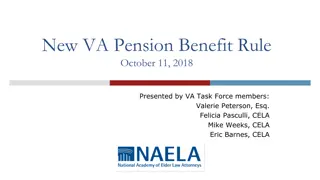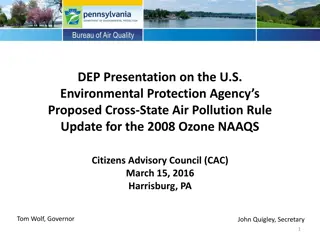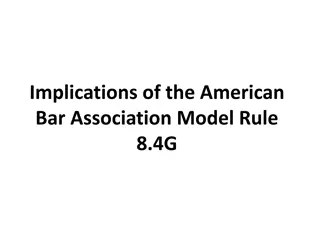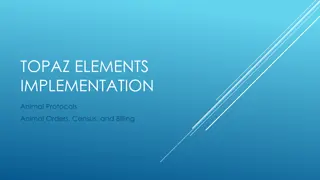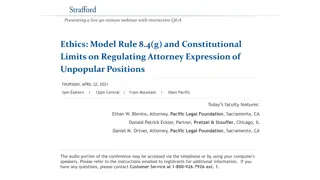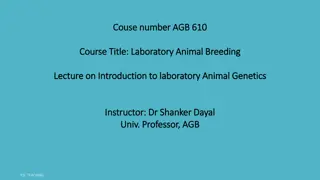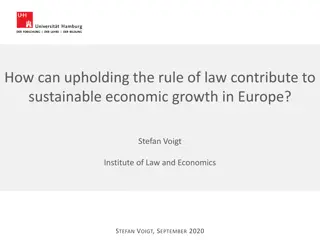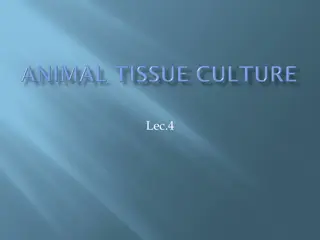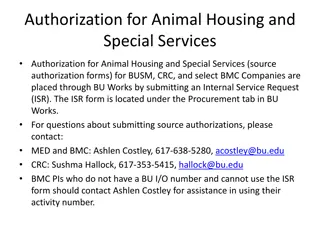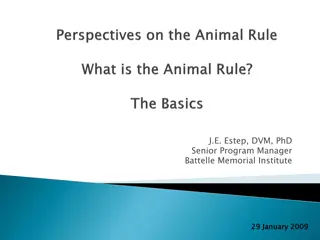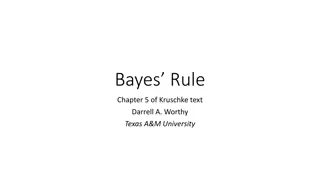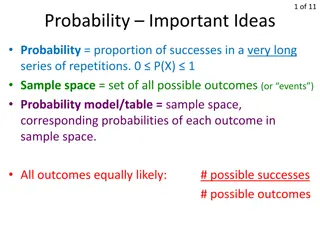History and Educational Programs of DEU Lab Animal Science Department
Established in 2004, the Department of Laboratory Animal Science at Dokuz Eylul University Institute of Health Sciences offers cutting-edge education focusing on animal welfare and ethical practices in scientific research. The department upholds the 3R Principle—Reduction, Refinement, Replacement�
0 views • 9 slides
Responsibilities of Facility Animal Care Committee at McGill University
The Facility Animal Care Committee (FACC) at McGill University oversees animal activities, ensures ethical treatment of animals, and adheres to guidelines from organizations such as the Canadian Council on Animal Care (CCAC). Responsibilities include continual oversight of animals, approving care pr
1 views • 13 slides
Emergency Response Proposed Rule - Worker Safety and Health Conference
The Emergency Response Proposed Rule aims to update regulations for worker safety and health, expanding coverage to include technical search and rescue and emergency medical service entities. The rule proposes replacing the existing Fire Brigades standard with an Emergency Response standard. Federal
2 views • 23 slides
Pascal's Rule in NMR Spectroscopy ( n+1 )
Pascal's Rule in NMR spectroscopy, also known as the (N+1) rule, is an empirical rule used to predict the multiplicity and splitting pattern of peaks in 1H and 13C NMR spectra. It states that if a nucleus is coupled to N number of equivalent nuclei, the multiplicity of the peak is N+1. The rule help
1 views • 30 slides
Feed Software Market is expected to reach $456.1 million by 2030
The growth of this market is attributed to the adoption of digital technologies and automation in the animal feed industry, the growing animal population, increasing demand for healthy animal-based food products, increasing animal health expenditure and pet insurance, and the growing need to reduce
0 views • 4 slides
Animal Welfare and Ethics: Standards and Regulations in India
The content covers a wide range of topics related to animal welfare, ethics, and laws in India. It delves into the definition of animal welfare, the role of veterinarians, animal welfare organizations, regulations like the Prevention of Cruelty to Animals Act, and protection of wildlife, working ani
0 views • 15 slides
TSA Updates on Security Training Rule for OTRB Companies
In the recent updates by TSA, the Security Training Rule for over-the-road bus (OTRB) companies has been highlighted. The rule mandates TSA-approved security training for employees in security-sensitive roles, emphasizing key requirements and elements of security training. Urban areas covered by the
1 views • 18 slides
Principles of Animal Breeding: Introduction and Historical Perspective
This unit covers the introduction to animal breeding, the application of genetics principles in breeding, historical perspectives including the work of Robert Bakewell, and key events in animal breeding evolution. Topics include breeding systems, importance of animal breeding, and notable figures in
1 views • 12 slides
Importance of Training in Animal Care and Use for Research
Training in animal care and use is essential to ensure humane and appropriate treatment of research animals, promote regulatory compliance, and uphold high standards of science and animal well-being. The presentation covers the necessity of training, goals including reviewing animal use and identify
0 views • 53 slides
Small Animal Restraints and Safe Handling Practices in Veterinary Technology
Importance of safe practice when working with small animals includes preventing harm, reducing injury, and minimizing stress. Proper animal handling methods and tools are crucial for the safety of both animals and handlers. Common methods of handling different species, demonstrating appropriate anim
1 views • 22 slides
Understanding the Difference: Animal Rights vs. Animal Welfare
Explore the nuanced distinction between animal rights and animal welfare, delving into the ethical considerations, philosophies, and advocacy efforts surrounding these concepts. Discover how animal rights proponents emphasize the equal rights of animals, while animal welfare focuses on humane treatm
0 views • 36 slides
Compliance Guide for Rule 205: Emission Offsets & Mobile Source Credits
Rule 205 outlines the process for generating emission offsets through voluntary mobile source emission reduction credits in Maricopa County. The rule-making process, state implementation plan submission, and permit conditions related to Rule 205 are discussed. The preparation for compliance includes
0 views • 7 slides
Understanding Fleming's Left Hand Rule and Electric Motors
Fleming's Left Hand Rule, also known as the Left Hand Rule for Motors, explains the interaction between charged particles and magnetic fields. Electric motors utilize this principle to convert electrical energy into mechanical energy through the interaction of magnetic fields and current-carrying co
2 views • 6 slides
Role of Veterinarians in Animal Welfare
Veterinarians, especially with the increasing number of female professionals in the field, play a crucial role in promoting animal welfare through daily practices, advocacy, education, and research. They are involved in various sectors like biomedical, wildlife, and farm animal research, as well as
3 views • 10 slides
Exploring Animal Management and Sociology in Education
Discover the intersection of animal management and sociology in education through a comprehensive course structure that covers topics ranging from animal welfare and ethics to practical husbandry. Dive into the significance of animal care in the UK economy and learn about various career paths in thi
2 views • 19 slides
Laboratory Animal Facilities Record-keeping Guidelines
Guidelines for maintaining records in laboratory animal facilities include provisions for animal housing, staff records, health monitoring, and standard operating procedures. Compliance with CPCSEA regulations ensures ethical review procedures for animal research proposals. Focus is on providing a s
6 views • 11 slides
Understanding the Rule of Law and Legal Systems in Wales and England
The content discusses the nature of law, the Welsh and English legal systems, and the Rule of Law doctrine. It includes observations from the 2019 AS Law Unit 1 examination, emphasizing the importance of adhering to rubrics and answering questions clearly. Candidates faced challenges with timing and
0 views • 14 slides
Understanding Allergies to Animals and Living Organisms
Allergies to animals and living organisms are a result of specific immune processes triggered by allergenic substances like proteins and peptides. This allergic response can be caused by various animal proteins such as dog allergens Can f.1, Can f.2, and Can f.3, and cat allergen Fel d1. The represe
1 views • 10 slides
Uniqueness of Human Language and Communication Contrasted with Animal Communication
Human language possesses unique properties such as reflexivity, displacement, and arbitrariness, setting it apart from animal communication. These distinctions enable humans to communicate abstract concepts, discuss past and future events, and use arbitrary linguistic forms. The contrast between hum
1 views • 17 slides
Phase 2 Comprehensive Rule Update Legislative Rule Package Overview
Seven subdivision bills were adopted during the 2023 session, covering various topics such as independent reviewers, cut and fill systems, connection to public sewer systems, and more. The public comment period and hearing are scheduled, with the draft rule to respond to comments by August 25. A bil
3 views • 17 slides
Exploring Human-Animal Interactions through 25 Years of Quality Research
Delve into the interdisciplinary realm of human-animal interactions with a focus on social sciences and quantitative research. Discover key themes such as social psychology, therapy, animal welfare, and more. Explore attitudes and personality differences related to animal treatment, empathy, and bel
1 views • 26 slides
Michigan Revised Lead and Copper Rule Implementation Experience
The Michigan Department of Environment, Great Lakes, and Energy shares insights on the implementation of the Michigan Revised Lead and Copper Rule. Key topics include rule revisions, data outcomes, challenges, and development drivers. The rule aims to reduce lead levels, update sampling protocols, a
0 views • 26 slides
EPA Rule 40 CFR Part 63 Subpart HHHHHH Overview
EPA Rule 40 CFR Part 63 Subpart HHHHHH, also known as The Refinisher Rule, sets standards for hazardous air pollutants in paint stripping and surface coatings operations. The rule aims to control emissions of target hazardous air pollutants in collision centers and surrounding areas. It outlines req
0 views • 20 slides
Understanding the Mailbox Rule in Contract Law
The Mailbox Rule, a common law principle, stipulates that acceptance of an offer is valid when dispatched, providing certainty in contract formation. This rule is illustrated through scenarios involving delays in mail delivery and parties' need for assurance in contractual agreements. The examples h
0 views • 14 slides
Evolution of Theory and Knowledge Refinement in Machine Learning
Early work in the 1990s focused on combining machine learning and knowledge engineering to refine theories and enhance learning from limited data. Techniques included using human-engineered knowledge in rule bases, symbolic theory refinement, and probabilistic methods. Various rule refinement method
0 views • 12 slides
Understanding Bayes Rule and Its Historical Significance
Bayes Rule, a fundamental theorem in statistics, helps in updating probabilities based on new information. This rule involves reallocating credibility between possible states given prior knowledge and new data. The theorem was posthumously published by Thomas Bayes and has had a profound impact on s
0 views • 34 slides
History and Implementation of Military Munitions Rule
The history and implementation of the Military Munitions Rule, including its origins in regulations like RCRA and FFCA, the involvement of key stakeholders, identification of issues in rulemaking, and ensuring safe transportation and storage of hazardous waste. The process involved extensive consult
0 views • 26 slides
Introduction to Bayes' Rule: Understanding Probabilistic Inference
An overview of Bayes' rule, a fundamental concept in probabilistic inference, is presented in this text. It explains how to calculate conditional probabilities, likelihoods, priors, and posterior probabilities using Bayes' rule through examples like determining the likelihood of rain based on a wet
0 views • 21 slides
Understanding the New VA Pension Benefit Rule of October 11, 2018
VA Task Force members presented key changes in the VA pension benefit rule, focusing on net worth limits, transfer rules, exclusions, look-back periods, and penalties. The rule aims to uphold program integrity and align with GAO recommendations, impacting eligibility criteria for applicants. Key sec
11 views • 55 slides
U.S. EPA's Proposed Cross-State Air Pollution Rule Update for 2008 Ozone NAAQS
The U.S. Environmental Protection Agency (EPA) issued the Cross-State Air Pollution Rule (CSAPR) in 2011, aiming to improve air quality by reducing power plant emissions across state lines. Challenges and subsequent revisions led to the proposed CSAPR Update Rule in 2015, targeting interstate air po
0 views • 27 slides
Implications of ABA Model Rule 8.4(g) on Professional Conduct
The American Bar Association's Model Rule 8.4(g) addresses professional misconduct in legal practice related to discrimination and harassment based on various factors. The rule has been adopted by some states, sparking discussions on its implications and challenges within the legal community. Explor
0 views • 67 slides
Upgrading to TOPAZ Elements: Enhancing Animal Protocols, Orders, Census, and Billing
The Animal Resource Facility (ARF) and Office of Animal Care Compliance (OACC) are shifting to TOPAZ Elements, a comprehensive web-based system, to streamline management of animal protocols, orders, census, and billing. This upgrade aims to provide better oversight for PIs, enhance compliance with r
0 views • 8 slides
Ethics & Constitutional Limits on Attorney Expression Webinar
Join the live 90-minute webinar on Ethics: Model Rule 8.4(g) and Constitutional Limits on Regulating Attorney Expression of Unpopular Positions featuring expert faculty members. Explore regulations governing lawyer speech and the requirements for lawyer communication in various contexts. Learn about
0 views • 57 slides
Understanding Laboratory Animal Genetics and Research Importance
This course (AGB 610) delves into the realm of laboratory animal breeding, exploring the significance of using animals in research and teaching. Dr Shanker Dayal, a distinguished professor, guides students through lectures on animal genetics and the common uses of laboratory animals. The course emph
0 views • 14 slides
Upholding the Rule of Law for Sustainable Economic Growth in Europe
Democracy and the rule of law are essential for sustained economic growth in Europe. The rule of law ensures stable and impartial enforcement of rules such as property rights and contract law, key for market economies. Upholding the rule of law is crucial for combating corruption and maintaining a f
0 views • 6 slides
Understanding Animal Tissue Culture and Cell Line Production
Animal tissue culture involves growing tissues separate from the animal in a laboratory setting. To achieve exponential cell growth, cells are converted into immortal cell lines. The production of a cell line involves steps like breaking cell adhesion, incubation, and transferring cells to fresh med
0 views • 22 slides
Authorization for Animal Housing and Special Services Process Guidelines
The guidelines outline the process for authorizing animal housing and special services at BUSM, CRC, and select BMC Companies through BU Works via Internal Service Requests (ISR). Investigators must submit ISR forms for animal housing at the Animal Science Center, monitor charges, and provide advanc
0 views • 8 slides
Understanding the Animal Rule in Drug Approval Process
The Animal Rule addresses the approval of new drugs when human efficacy studies are not possible. It serves as a surrogate for human studies, requiring well-controlled animal testing to predict clinical benefits in humans. Safety must still be demonstrated in human trials, and the rule can be bypass
0 views • 27 slides
Bayes’ Rule
Bayes Rule, a fundamental concept in statistics, explores how prior beliefs are updated based on new evidence. This rule, named after Thomas Bayes, has had a profound impact on statistical inference and has been further developed by mathematicians like Laplace. Exploring the probabilistic reasoning
0 views • 34 slides
Understanding Probability: Key Concepts and Rules
Probability is the proportion of successes in a long series of repetitions. Important ideas include the 0-1 Rule, the 100% Rule, the Complement Rule, the Addition Rule, and the Multiplication Rule. These rules govern the calculation of probabilities in various scenarios. Learn the fundamental princi
0 views • 16 slides




